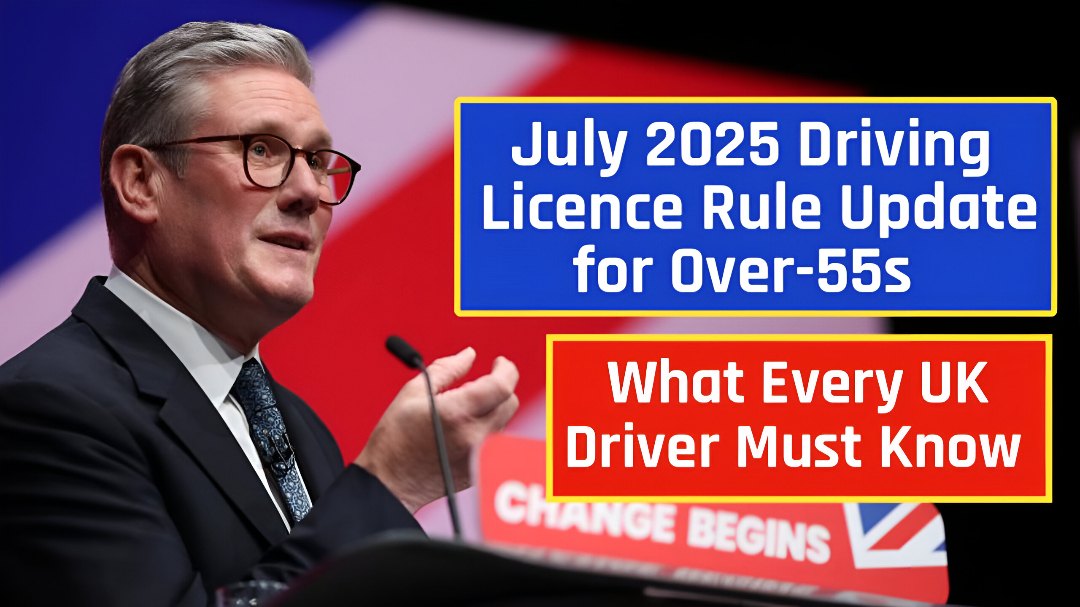The UK’s driving licence regulations are changing again in July 2025 — and this time, the focus is on motorists aged 55 and over. Whether you’ve been driving for decades or only recently passed your test, the DVLA’s latest updates could have a direct impact on your licence renewal, medical requirements, and even the types of vehicles you’re allowed to drive.
For millions of drivers, staying informed about these changes isn’t just a matter of convenience — it’s essential to make sure you remain legally on the road.

In this guide, we’ll break down exactly what’s changing in July 2025, why these changes are happening, and what steps you should take now to prepare.
Why the DVLA Is Updating Licence Rules for Over-55s
The DVLA regularly reviews driving licence rules to reflect advances in road safety, health guidelines, and ageing population trends. Over the last decade, there’s been a sharp increase in the number of drivers aged 55 and older.
The July 2025 update is being introduced for several reasons:
- Longer life expectancy means more drivers staying on the road into their late 70s and beyond.
- Medical research shows certain health conditions become more common in the mid-50s and later years, which can affect reaction times, vision, and coordination.
- Technological changes in vehicles, including more automated systems, require updated testing and safety awareness.
The goal is not to take licences away, but to make sure drivers remain safe, confident, and legally compliant.
Key Changes Coming in July 2025
Here’s a breakdown of the main changes you need to know:
1. Earlier Medical Declarations
Currently, most drivers don’t have to make a medical declaration until they renew at age 70. From July 2025, drivers aged 55 and above will be required to complete a short medical self-declaration when renewing their licence or applying for certain categories.
The form will ask about:
- Vision changes
- Heart and blood pressure conditions
- Neurological issues
- Sleep disorders that could affect driving
If you declare a condition, the DVLA may request a GP report or specialist assessment before your licence is renewed.
2. Shorter Licence Validity Periods
For some drivers over 55, the DVLA will now issue licences with shorter renewal periods — typically 5 years instead of the standard 10 years.
This will mostly affect those who:
- Drive heavier vehicles (HGV, bus licences)
- Have certain medical conditions
- Hold higher-risk driving categories
This doesn’t mean you lose your licence; it simply means more frequent renewals to ensure everything is up to date.
3. Stronger Vision Testing Requirements
From July 2025, you’ll need to meet stricter eyesight standards when renewing at 55 or older. This may include:
- Reading a number plate from 20 metres in good daylight
- Providing proof of recent optician visits
- Declaring whether you use corrective lenses for driving
If you don’t meet the standard, you may need to pass a DVLA-approved eyesight assessment before you can continue driving.
4. Updated Rules for Medication and Driving
Many over-55s take regular prescription medications, but some can affect alertness or reaction time.
From July 2025, certain medications will require automatic DVLA notification, even if you’ve been taking them for years. Examples include:
- Strong painkillers (opioids)
- Some anxiety or sleep medications
- Certain blood pressure drugs that cause dizziness
Failing to declare could mean fines or even prosecution if you’re in an accident.
5. Refresher Course Encouragement
While not mandatory, the DVLA is strongly encouraging over-55 drivers to take voluntary refresher courses to stay up to date on:
- Changes to Highway Code rules
- Modern vehicle safety tech
- Hazard perception
Some insurance providers are expected to offer discounts for drivers who complete these courses.
How This Affects Your Licence Renewal Process
If your licence renewal falls after 1 July 2025 and you’re aged 55 or over, you should expect:
- Additional medical questions
- Possible GP or optician verification
- A shorter renewal period (for some categories)
- Stricter rules on medical notifications
It’s important to plan ahead — don’t wait until the last week before your renewal is due. If the DVLA requests extra checks, the process could take weeks.
Why These Changes Shouldn’t Cause Panic
Some drivers may worry these changes are a step toward limiting older motorists’ rights — but the DVLA has stressed that the aim is safety, not restriction.
In fact, many drivers will find the process straightforward if they’re already in good health and keep up with regular check-ups.
Common Myths About the New Rules
Myth 1 – “I’ll automatically lose my licence at 55”
False. You won’t lose your licence unless you fail to meet basic safety and health standards.
Myth 2 – “It will cost a fortune to renew”
Licence renewal costs remain the same — the changes are about checks, not fees.
Myth 3 – “I’ll need to take a driving test again”
Only drivers with serious medical or safety concerns will be asked to take a test.
What You Should Do Now
If you’re 55 or older, it’s worth:
- Booking an eye test in the next few months
- Speaking to your GP about any conditions that could affect driving
- Checking your licence expiry date now
- Keeping a note of any medications you take and checking DVLA rules
The Bigger Picture – Ageing Drivers in the UK
According to DVLA data, the UK now has over 5 million drivers aged 70 or older, and many more in their late 50s and 60s. With people living — and driving — longer, these updates are designed to keep roads safe while respecting independence.
Final Word
The July 2025 driving licence rule update for over-55s is one of the most significant DVLA changes in recent years. By acting now, keeping your health in check, and staying informed, you can ensure that you remain on the road with confidence.